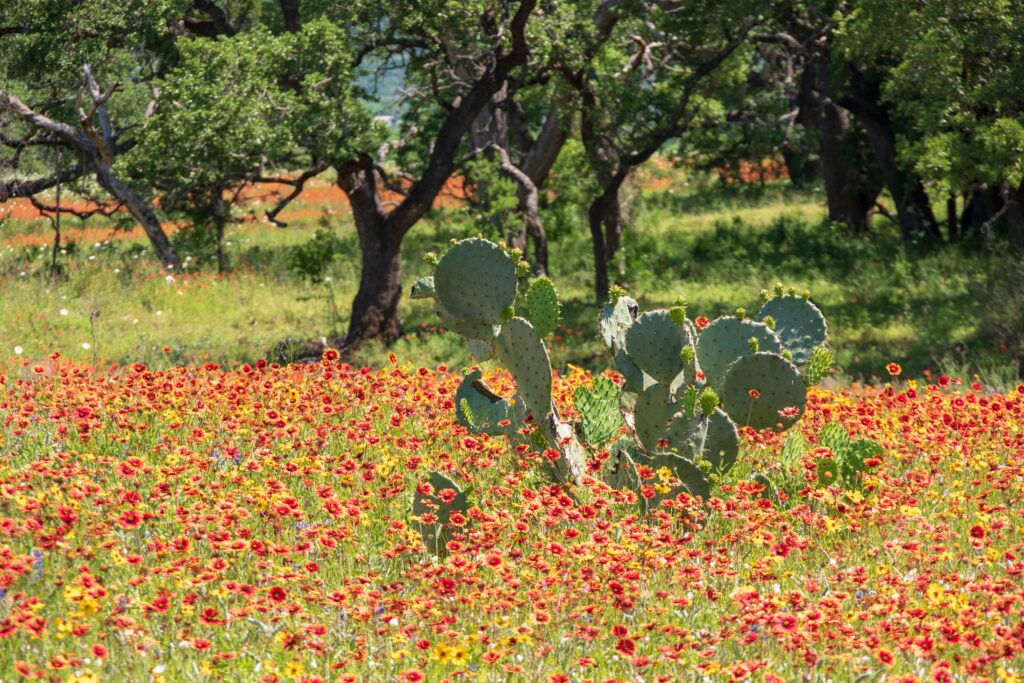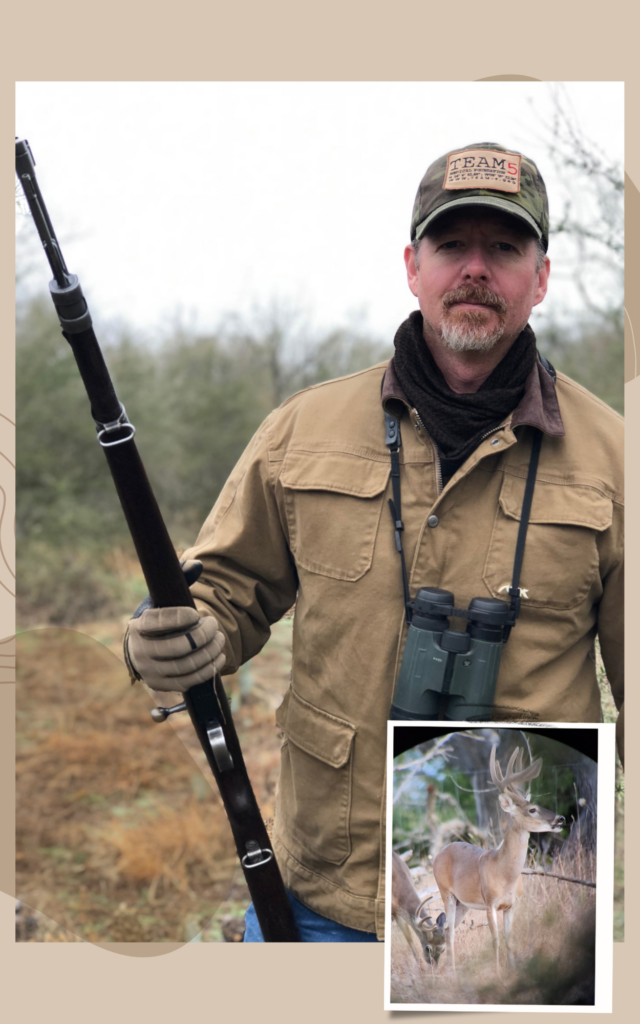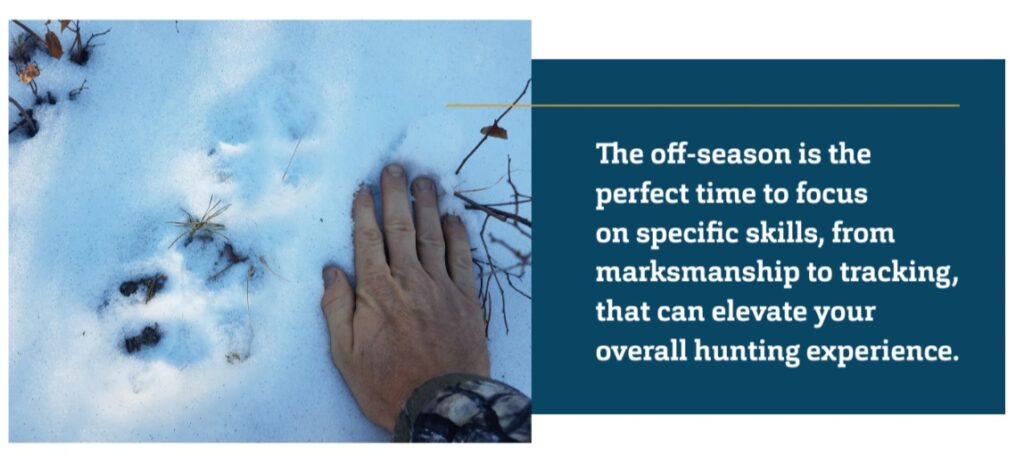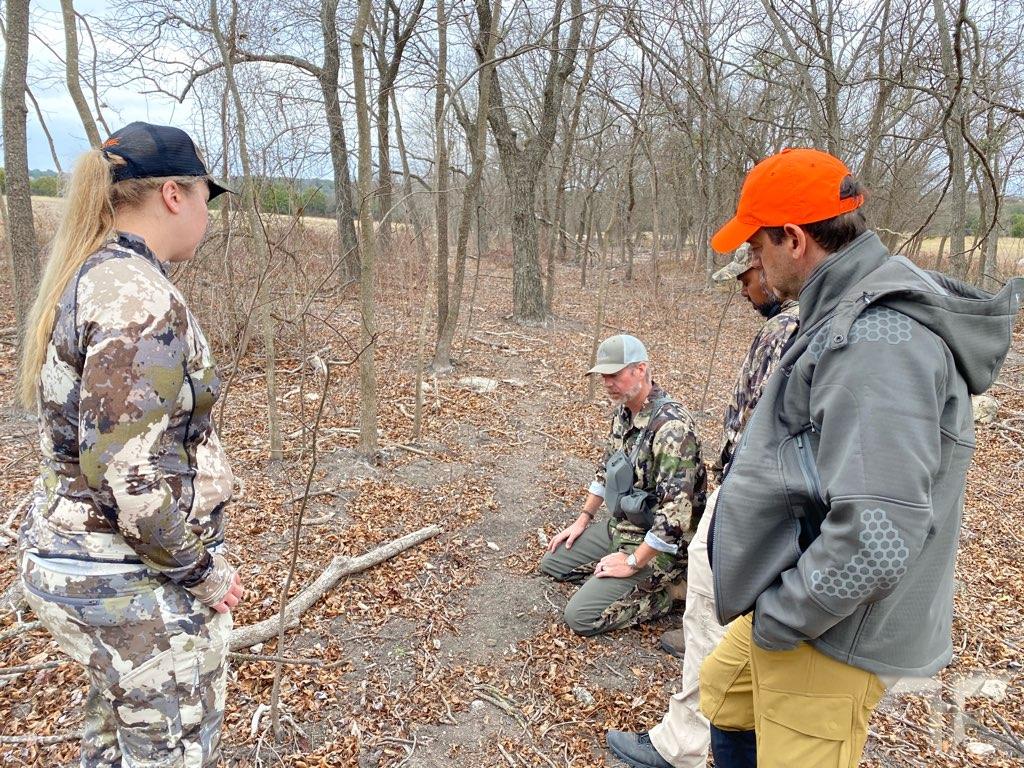Preparing for the Hunt: Off-Season Essentials for Texas Hunters
May 15, 2024
BY: HOPE BOATRIGHT
As spring and summer unfold in Texas, hunters eagerly anticipate the approaching season with guns at the ready, freezers emptied, and eyes locked on the calendar. The off-season is a crucial time for outdoorsmen and women to not only recharge and reset but also to prepare and organize to hit the ground running when opening day finally arrives.
Jon Wayne Taylor, a seasoned and lifelong Hill Country hunter, former army medic, as well as an expert in tracking and blood trailing, recently sat down with Colorado River Land Trust to share his invaluable insights and off-season tips to help hunters prepare for pursuits on both public and private lands. Here are his top three recommendations to focus on, no matter where your hunting adventures may take you this fall.

Scouting and Land Awareness: Unlocking Your Territory: The Art of Off-Season Scouting
The off-season presents an opportunity to enhance and gain crucial knowledge of where you will be hunting. The information gathered during this time can be vital once the hunting season begins, and whether you’re hunting private land or public land, Jon Taylor stresses that the most important thing is that you are in tune with the land, animals, and your surroundings. His number one rule is to spend time where you’re hunting when you’re not hunting so you know where you’re going to be hunting.
For Taylor, “it’s also one of the most enjoyable things about hunting. Every seasoned hunter enjoys every season. And the more time you spend in the field where you’ll be hunting, not just the better hunter you’ll be, the better steward you’ll be.”
Private Land
If you’re hunting your land or private land, “this is really easy. Go sit in the woods. Be quiet. Don’t move around. Sit there. Wait an hour. Listen to what’s going on. This will give you a great idea about the families, and what they eat, what animals move through the area.”
In the offseason, he walks his Hill Country property twice a day, once in the morning, and once in the evening. What he is looking for is not just where the animals are going, but the health of particular plants; he’s looking to see where the animals are going, and how many animals he has at a given time. The biggest lesson he stresses is to just pay attention.
“You’ll learn who’s related to whom, you’ll learn changing patterns – you’ll learn a lot, I certainly do.”
Public Land
For public land, it can be very challenging especially if you have to travel to it. If you liked hunting there, Taylor says, “Go there in the offseason, take your family, go on a vacation, camp out. But this can really be hard to do, especially for out-of-state hunting.”
If you’re going on a guided hunt on public land, there’s no reason not to ask your guide if you can visit in the offseason. Most of the time, guides will say yes, and if they do say no, ask your guide about the habits of the animals. “Where are the animals? What’s the cut? Ask your guide what animals are moving through the area.”
Taylor reiterates, “The best thing anybody could do to be a better hunter is to spend time in the field when you are not hunting.”
Fitness and Conditioning:
Elevating Your Hunt: The Off-Season Fitness Regimen
The heat of summer may have you dreaming of cooler days spent in the field, but don’t let the off-season be an excuse to neglect your physical preparedness. Staying in shape is a year-round commitment that can significantly impact your success when the hunting season arrives.
The connection between physical fitness and hunting prowess is undeniable. Whether you’re trekking through rugged terrains or holding a steady aim for an extended period, a well-conditioned body can make all the difference. Endurance, strength, and flexibility are the pillars of effective hunting, and the off-season provides the perfect opportunity to focus on these aspects.
For Taylor, skill development and physical fitness are a trade-off, “the less fit you are, the better your skill set has to be.” He focuses on three things to stay in shape and elevate his game.

“Cardiovascular fitness is pretty important and if you’re doing any kind of mountain hunting, put on that pack and go to that Stairmaster and stick with it every day.” Cardiovascular fitness is imperative, “not just so that you can physically get up and down things, but so that when it is time to shoot, you are still.” Cardiovascular vitality helps to get you where you want to hunt, “but it has a truly radical significance on your quality of marksmanship. That’s it.”
The second physical skill Taylor recommends is incorporating flexibility into your off-season workout routine, especially if you’re planning on hiking and hunting in the backcountry. “You’re moving in weird ways, especially if you’re mountain hiking,” and focusing on your lateral stability is a very important part of flexibility.
The last tip Taylor gives regarding physical ability and preparing for the upcoming season is to work on your eyes. His top tip for keeping his eyes in shape is to “keep your eyes away from a screen as much as possible.” While that can be challenging for most folks, he also uses a simple eye exercise that he has been using for decades. He focuses on a fine point close to his face, and then looks at a point far away and focuses on that, and then a fine point close again, and then at the far-off point again. “This is an exercise I do every day that makes a massive difference, and every optometrist will tell you that this is the best thing for your eyes.”

Whether you’re hunting small game or big, committing to a well-rounded fitness routine including taking care of your eyes during the off-season, will help you enter the upcoming season with increased stamina, improved strength, and the flexibility needed to navigate the physical challenges of the hunt.
Skill Development:
Hone, Track, Shoot: Off-Season Strategies for Skill Mastery
While physical fitness and scouting are crucial, honing your hunting skills is equally important. Mastering the art of hunting requires a combination of precision, patience, and strategic thinking. The off-season is the perfect time to focus on specific skills, from marksmanship to tracking, that can elevate your overall hunting experience.

For Taylor, there are several important arrows in his skills development quiver, the most important being learning to shoot your weapon really well. He adds, “Learn to shoot from awkward positions, and learn what it takes to sit and be still in awkward positions.”
He also recommends taking game tracking courses and especially learning how to blood trail. Taylor’s favorite tracking program is through Nature Reliance School in the northeast which offers a definitive guide on tracking and trailing. “Practice being still and then ground tracking and blood trailing. These are skills that can’t be learned from your kitchen.”
By prioritizing skill development, fitness, and conditioning during the off-season, hunters can approach the upcoming season with newfound confidence and expertise. The off-season provides an excellent opportunity to fine-tune your abilities, ensuring you’re at the top of your game when the hunting season kicks in.
Jonathan Taylor is a former army medic, lifelong Texas Hill Country hunter, and competitive shooter. He is an instructor at Tactical Fitness and teaches basic hunting, tracking, and blood trailing, and has published over 400 articles online in print about guns. Taylor is currently the CEO of Action Underwriting, an insurance company focusing on the commercial firearms manufacturing industry.
Salsa Verde & Wild Game from the kitchen of Chef Austin Simmons of Tris
February 11, 2025
Texas’ White Bass Run
February 11, 2025
From the Spring to Spirit: Goodnight Loving Vodka
February 11, 2025